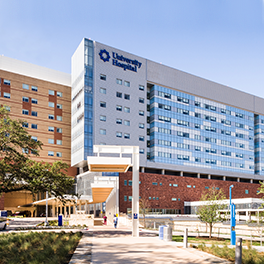Transcatheter tricuspid valve replacement (TTVR) is a minimally invasive procedure that replaces a damaged tricuspid valve with a new artificial one.
When the tricuspid valve does not shut properly, blood leaks backwards, resulting in tricuspid regurgitation. This can cause symptoms including:
- Shortness of breath
- Swollen legs
- Swollen stomach
- Fatigue
- Heart palpitations
What Is TTVR?
TTVR uses a catheter guided through a vein in your groin. Your cardiologist at the University Health Structural Heart and Valve Center will carefully guide the catheter to the right side of your heart to place the new valve. You will be under general anesthesia during the procedure and will not feel any pain.
After the procedure, you will recover in the hospital for two or three days. Recovery time varies by person, but it is a faster recovery than open-heart surgery. You will likely be able to resume normal activities in about one week, but your doctor will provide recommendations specific to you.
Who Qualifies for TTVR?
You may qualify for TTVR if you:
- Show symptoms of severe tricuspid regurgitation
- Are not a suitable candidate for open-heart surgery
Benefits of TTVR
- Minimally invasive
- No large incision or scarring
- Quicker recovery time
- Immediate improvement in symptoms
- Low-risk procedure
TTVR in San Antonio
University Health is one of the very few centers in South Texas to offer advanced treatment for tricuspid valve disease. Through its comprehensive Tricuspid Valve Clinic and team of valve experts, University Hospital has become the only center in South Texas to provide both TriClip therapy and Transcatheter Tricuspid Valve Replacement (TTVR)—making it a leading destination for patients seeking state-of-the-art tricuspid valve care.




